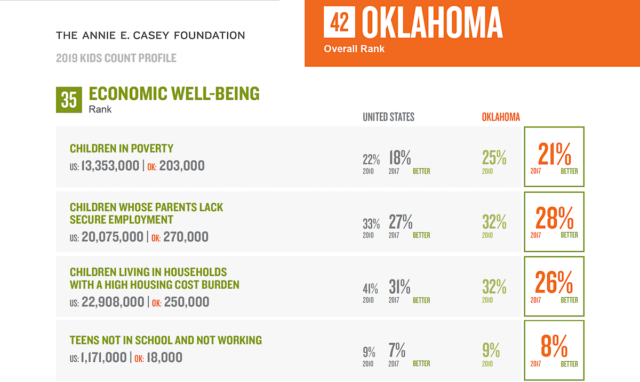Oklahoma ranks in the bottom 10 states in the nation for child well-being with an overall ranking of 42nd out of all 50 states according to the 2019 KIDS COUNT Data Book from the Annie E. Casey Foundation.
The 2019 KIDS COUNT Data Book — the most comprehensive annual report on child well-being in the United States — notes measurable progress for the nation’s kids since the first Data Book, which was published in 1990. Nevertheless, more than 13 million U.S. children live in poverty, including about 1 in 5 children in Oklahoma, and serious racial and ethnic disparities persist. The report is evidence that even in years when the economy is strong, far too many Oklahoma kids don’t have the resources they need to thrive.
The annual KIDS COUNT Data Book from the Annie E. Casey Foundation ranks each state across four domains — health, education, economic well-being and family and community. The best ranking for Oklahoma came in economic well-being (35th). Oklahoma was close to the national average for children with at least one full-time employed parent, but the state’s child poverty rate remains significantly higher than the nation’s.
One drag on economic security for Oklahoma children is that lawmakers effectively ended the state Earned Income Tax Credit (EITC) for most of Oklahoma’s lowest income working families by making it non-refundable in 2016. Now that the state budget has recovered, restoring the EITC should be a top priority.
The report also shows a need to address ethnic and racial inequities. A growing percentage of Oklahoma’s child population are children of color, but these children still experience significantly higher poverty rates and are much more likely to have incarcerated parents. Besides Oklahoma’s excessive use of prisons, the debtors’ jails created by a broken system of fines and fees continue to take far too many parents away from their kids and drain wealth from our communities.
#oklaed ranking state’s lowest
Oklahoma’s lowest ranking came for education (45th). The Data Book ranking is based on data from 2017, before lawmakers funded a teacher raise and began to reinvest in education. Oklahoma’s large decline in fourth-grade reading proficiency rankings (from 35th in 2015 to 44th in 2017) may relate to the state’s mandate to retain children in the third grade if they don’t pass a reading test. Fourth-grade reading proficiency jumped in 2015 when those students with the lowest reading scores remained in third grade, but now that this class has moved on to fourth grade, scores have fallen back to the pre-retention trend.
Oklahoma ranked 40th in the family and community domain. Although Oklahoma has seen large reductions in teen births since 2010, the teen birth rate is still third highest in the nation, better than only Mississippi and Arkansas.
Finally, the state ranked 43rd in health. For the last three years, Oklahoma’s child uninsured rate has hovered around 8 percent. In 2017, that gave us the fourth-highest share of children without health insurance in the U.S.
For the sake of all children, Oklahoma should expand access to Medicaid. Expanding Medicaid for working adults would reduce our child uninsured rate as parents with coverage are much more likely to get their children covered, and it would protect children by making sure all parents can access treatment for chronic diseases and mental illness.
As Casey Foundation President and CEO Lisa Hamilton said, “America’s children are one-quarter of our population and 100 percent of our future.”
Going forward, we must change course to adopt the policies that support children and families, especially those struggling with low incomes. Far from becoming a top ten state, Oklahoma has yet to escape the bottom.
The 2019 KIDS COUNT Data Book
https://nondoc.com/wp-content/uploads/2019/06/aecf-2019kidscountdatabook-2019.pdf” height=”450px” download=”all”]






















